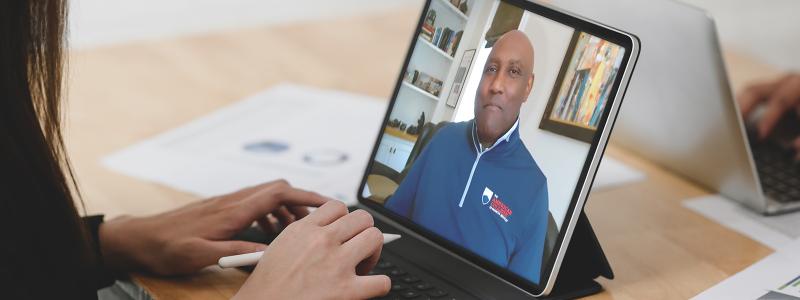Diversity, Equity & Inclusion Insights
Small Business Advisory Services in Diverse, Underserved Communities

The Centrality of Small Businesses in the U.S. Economy
According to the Small Business Administration’s 2020 Small Business Profile, there are 31.7 million small businesses in the United States, including six million from communities of color. The small business sector has a significant impact on the economy, comprising 99.9% of all business and employing 60 million people. Small businesses' survival and growth is vital to the growth and sustainability of the U.S. economy.
COVID’s Impact on Small Businesses and Especially Minority Owned Firms
Additionally, McKinsey Consulting reports that Black and minority owned business have a much higher failure rate than the national average, mostly due to undercapitalization of the business. A working paper from Fairlie (2020) reports recent data from the National Bureau of Economic Research indicating small businesses have been hard hit by the pandemic. Active business operations dropped by 22% during a two-month period between February and April 2020, with black-owned businesses down 41%. Other minorities were also harder hit than the average. Data from the New York Federal Reserve paints a similar picture. The Small Business Credit Survey found minority business owners hit much harder than average. Overall results indicated 57% of firms characterized their financial condition as “fair” or “poor”. Unfortunately, this figure jumped to 79% for Asian-owned firms, 77% for Black-owned firms, and 66% for Latin-owned firms.
While we don’t yet have data on the connection between small business survival rates and access to a personal financial planner, one area of further study should be whether financial advisory relationships have improved outcomes for small business owners. Moreover, studying the characteristics of those relationships, such as the length of advisory services, whether services began prior to small business formation, and how comprehensive the advisory work was could provide qualitative research details to facilitate small business sustainability.
Financial Planning is Important for Entrepreneurs and Small Business Owners
Entrepreneurs have unique qualities that set them apart, whether it's family relationships, personal and business goals, economic and noneconomic goals, and behaviors and attitudes. Providing financial planning services for entrepreneurs and small business owners can be both challenging and intellectually fascinating at the same time. The intertwined business management, personal relationships and firm ownership issues and goals create financial planning complexities, rendering the advice of an advisor particularly valuable. Indeed, researchers that study this topic found that women entrepreneurs' access to capital was predicated more on the quality of their personal finances than the assets of the business.
Central to theirs and other findings was that a significant contributing factor in the failure of entrepreneurs was the inadequacy of their personal capital, personal liquidity shortfalls, and poor personal tax planning. This finding could lead small business lenders and those who serve women entrepreneurs to include personal financial planning services as part of the portfolio.
Small Business Advisory Services as a New Market Opportunity
The guiding assumption in financial planning and counseling is that those who use the help of a financial professional to build and implement a goals-based plan will ultimately achieve success. Most would agree that's best done by working with a financial professional that understands the business and personal goals and objectives of the individual or entrepreneur. Many financial planners are looking for ways to build their client base, and opportunities to market to potential client segments that they feel might be lucrative.

From a business standpoint, entrepreneurs (family and non-family businesses, and solo operators) can be an important source of business for planners, mostly due to their complex situations. Most practitioners and researchers point to the intertwining nature of an entrepreneur’s personal goals, such as retirement and estate planning, coupled with business goals such as firm leadership and business development. Many financial planners are also looking for ways to contribute to societal value. Advising underserved individuals and communities would advance these dual goals.
What You Can Do Next
- Keep in mind that many small businesses, especially minority owned, are struggling right now just to keep their doors open. If that’s the case, find some businesses in your community and help them by being a cash-flow thought partner to help them stay afloat until things improve. Don’t underestimate your abilities as a business person. You may not know their business, but being available to help them make good decisions could open new doors and pivot opportunities. As the economy recovers, long-term planning services can be integrated into the relationship.
- Most communities have non-profit organizations that serve small businesses and entrepreneurs, such as the Small Business Development Centers, sponsored by the Small Business Administration. Some specialize in underserved groups. Establish relationships with these associations to offer financial planning or education services to their members. Services could include group-based education seminars about the importance of financial planning in their business. Some accept volunteers to serve as mentors (for example, Pacific Community Ventures). Small steps such as establishing an emergency fund, or finding a good CPA to help with taxes can reap big rewards.
- Consider beginning with Pro Bono services, and once the business recovers and starts to grow again, then slowly develop a trust-based long-term relationship that enables mutual financial benefits.
Conclusion
Small business survival and growth are vital to the sustainability of the economy. Improving access to personal financial planners could be an important factor in the mission to help close the racial and gender wealth gap. Advisors can play a vital role, and simultaneously develop a new market at the same time.
After We Vote...What Comes Next?

As former Supreme Court Justice Louis Brandeis once said, “The most important office, and the one which all of us can and should fill, is that of private citizen.” Wise words from a Kentucky native like myself.
Once we count the votes, what comes next? The American College of Financial Services remains focused on how governance affects wealth building, small business planning, Social Security claiming, and more.
Our expert faculty is on the pulse of market thinking – both how it’s priced into the pre-election environment, as well as how it may react to President Donald Trump’s re-election or a change in power to a Joe Biden administration. Faculty continues to assess the potential of additional fiscal stimulus, a CARES Act 2.0, and how it could impact many of the areas noted above. There’s also issues like how the next President may maintain or alter 401(k) vehicles, or how executive and legislative control may affect retirement planning. We already have a November 12 webcast on the calendar to discuss the possible effects on Social Security, Medicare, and other vital support programs. Make sure to join Adjunct Professor of Advanced Planning Steve Parrish, JD, RICP®, CLU®, ChFC®, RHU®, AEP®, American Retirement Association researcher Jack Towarnicky, MBA, JD, LLM, CEBS, and Sandy McCarthy, President of Retirement Services at OneAmerica, for this engaging discussion. CFP® and College CE are available.
The 14 ½ Conference of African American Financial Professionals (CAAFP) was an overwhelming success, shattering all records for the annual event. We're excited to announce that the largest conference of Black financial services professionals is back with more timely, relevant knowledge, including the first CAAFP breakout session, sponsored by Nationwide, on Thursday, November 19. It will feature insights on the Election from Donna Brazile, veteran Democratic political strategist, as well as Ramesh Srinivasan, Professor at UCLA's Department of Information Studies, and Director of UC Digital Cultures Lab, discussing artificial intelligence, proxy discrimination, and the Election. Sign up now.
When the dust settles, we are the educational partner with answers to your most important question: “What does this mean for my clients?”
Across 16 Presidents, The College has delivered the applied knowledge professionals need to grow their business, and their clients need to support their families and build out their retirements.
We stand ready to do that again – not just with our professional designation programs, but through webcasts, white papers, blogs, infographics; anyway we can convey the knowledge you need, when you need it.
Washington, D.C. makes law, then you’re responsible for putting strategies into place that help your clients achieve their financial goals. We’re that intermediary that synthesizes the laws, rules, regulations, and policy proposals into actionable information. It’s a great illustration of our belief that knowledge should always be at the intersection of academic and applied – rooted in theory and explained in practice.
Happy Election Day Month
The Microcosm of Our Mission

Strategically, this meant a shift away from a correspondence model to an embrace of innovation complete with a new learning management system and a new Personal Pathway™ learning model that puts the student in charge of how, when, and where they learn. COVID-19 will only accelerate the transition from in-person to online education in the future, and it’s a trend The College is out in front of thanks to our investment in the student experience.
This also required us to re-think who we consider our potential student. Typically, our student has been a traditional financial professional, generally a white male. Now, through The American College State Farm® Center for Women in Financial Services and The American College Penn Mutual Center for Veterans Affairs, The College is educating and empowering the profession’s female agents, advisors, and future leaders, as well as our nation’s heroes starting a second career of service.
We are also aiming to increase industry diversity through our African American Scholarship Program and HBCU Student Scholarships, and will continue to promote leadership education and recruiting and retention efforts for Black professionals and other underrepresented groups through The College’s new Center for Economic Empowerment and Equality.
We also continue to see growth outside of financial services with an increasing number of nonprofit executives and fundraisers earning their Chartered Advisor in Philanthropy® designation. So, as you can read, our students are more diverse – by race, gender, age, and job function.
This sea change is strategic. The College is a financial knowledge institution, not a financial services institution. This opens avenues to spread knowledge to anyone and everyone who wants and needs it.
Case in point, on November 19, I’ll participate in three events: OneAmerica’s® Leading Tomorrow Speaker Series, the first Conference of African American Financial Professionals Breakout Session, and a program with The National Capital Gift Planning Council (NCGPC).
I’m honored to be part of a speaker series that includes experts on generational planning, Alzheimer’s, and IRA distribution strategies. OneAmerica® and its Chief Executive Officer Scott Davison are also passionate believers in The College, and Scott currently serves as the Chairman of our Board of Trustees. I will speak to members of the OneAmerica® distribution network about racial and economic equality for Black America and the diversity and inclusion initiatives at the forefront of The Center of Economic Empowerment and Equality’s Four Steps Forward plan.
We successfully held a virtual version of The Conference of African American Financial Professionals this past August, and in an effort to continue the fellowship and learning beyond the event, we’re holding the first breakout session with accomplished leaders in politics and artificial intelligence. I’m proud to help introduce Donna Brazile, veteran Democratic political strategist and Fox News contributor, and Ramesh Srinivasan, Professor at UCLA’s Department of Information Studies and Director of UC Digital Cultures Lab. It should be a fantastic post-mortem of the Election and a look at how AI is influencing financial services.
Finally, I’ll speak to the NCGPC about how to harness philanthropy’s power for tangible impact. I’m currently going through our CAP® program myself because I understand the immense value this knowledge can have on my community and The College’s efforts in this space.
Talk about a day that extenuates The College’s transformative path – conversations with agents and advisors, the Black financial professional community, and today’s nonprofit leaders. I’ll continue to spread the word of our work to benefit society, and help amplify The College’s noble cause to all it helps empower.
Conversation with The President: How’s The College Transformed the Student Experience?

To end 2020, I sat down to answer four pressing questions summing up The College’s 2020. I touched on technological advances, a renewed focus on transformative e-learning, and the potential outcomes The College can foster in economic empowerment and equality.
First, I discussed the strategic sea change in The College’s delivery of applied knowledge. The two cornerstones of that strategy are Brightspace, The College’s new learning management system, and Personal Pathway™, its new learning model now available through the Chartered Financial Consultant® (ChFC®) designation and CERTIFIED FINANCIAL PLANNER™ (CFP®) education programs, as well as several courses in the Chartered Life Underwriter® (CLU®) program.
Instead of outlining features and benefits – visit the program pages above to view the highlights – I looked into the future to help the financial advisor, life insurance agent, nonprofit fundraiser, or executive leader understand what this shift in thinking and execution will mean for them.
Listen to the short interview below, and make sure to subscribe to this blog to remain on the pulse of new College initiatives.
Conversation with The President: What's the Lasting COVID Effect on Knowledge Delivery?

To end 2020, I sat down to answer four pressing questions summing up The College’s 2020. I touched on technological advances, a renewed focus on transformative e-learning, and the potential outcomes The College can foster in economic empowerment and equality.
While these strategic successes are important to celebrate, they’re even more rewarding in the midst of a once-in-a-generation pandemic. COVID obviously has immediate impacts on our public health, the fabric of our communities, and the way we live. Long-term, the impacts will cascade down to the ways we learn.
The College is prepared to meet the learning needs of those who desire to absorb knowledge and pass it on to their clients, colleagues, and communities. Here are my thoughts on what’s next for knowledge delivery and how The College aims to meet the needs of the 21st-century learner. Listen to the short interview below, and make sure to subscribe to this blog to remain on the pulse of new College initiatives.
Conversation with The President: Where's The College Expanding Its Educational Footprint?

The College’s mission is to deliver applied knowledge and education, to promote life-long learning, and to advocate for ethical standards for the benefit of society (emphasis mine as I transition to my perspectives on what’s next).
Benefiting society is a noble pursuit that’s more inclusive and welcoming. One way to empower people is through the transfer of applied knowledge across a variety of topics. The College is not content sitting in a stale silo – because the breadth of needed financial knowledge is evolving. It’s not just about product solutions, but also behavioral thought. It’s not just about pen and paper, but also leveraging new technology to improve experiences.
Here are my thoughts on a few areas where The College can leverage its expertise, its industry partnerships, and its learning delivery model to make a real difference in the years ahead.
Listen to the short interview below, and make sure to subscribe to my blog to remain on the pulse of new College initiatives.
The Best of Both Worlds

From the privacy issues raised by listening systems like Amazon’s Alexa to the growing discussion of Facebook, Twitter, and other platforms’ role in spreading disinformation, society at large is starting to recognize that technology in general, and artificial intelligence (AI) systems in particular, need to be better monitored and integrated into our lives. The financial services sector, for its part, faces a similar reckoning with the rise of robo-advisors: however, choosing to work with AI rather than against it may offer both sides of the financial planning divide a chance to benefit.
Since the earliest days of automation, there has been concern about machines eventually supplanting the jobs humans currently do, leading to not only economic instability but social concerns about surrendering control of our lives. Naturally, this leads to animosity and the sense that machines everywhere are “taking our jobs” and that they must be prevented from doing so. During the 2008 financial crisis, when confidence in the financial services system was severely shaken, several companies arose on the basis of using what they called “robo-advisors”—in actuality, collections of computerized programs and algorithms—that would quickly, efficiently, and dispassionately offer portfolio building to a wide array of clients. The appeal of machine-based advising was attractive to many investors who no longer trusted human advisors to manage their money responsibly, as well as to clients who didn’t have enough assets to attract human advisors looking for high-net-worth clients; in this way, robo-advisors helped democratize portfolio building. But many in financial services attacked the robo-advising model as an overly simplistic system that couldn’t possibly match the nuance, experience, and intuition that make real people so valuable long term. They saw robo-advising as direct competition that was seeking to replace them, and robo-advising firms, for their part, did nothing to dissuade them.

Since then, however, the attitude in the financial services industry toward robo-advisors has markedly changed, based on a realization that is occurring among professionals in various fields: while machines may be able to do certain things better and faster than people, they often lack a “human quality” needed to make wise decisions that may for one reason or another buck traditional logic. Machines just can’t think outside the box like we can (yet); therefore, even though they can and should be used to perform jobs humans can’t accomplish on their own, they require guidance and a human touch to work to their full potential.
The fact is, robo-advisors undeniably provide many advantages to savvy financial planners. They can sort through and process vast amounts of data to make decisions that are more timely and more informed than any human financial advisor could hope to produce. Robo-advisors can also be tailored to specific tasks, from risk management to client goals or investment outcomes, to provide specialized and laser-focused advice in fields like estate planning, life insurance, retirement planning, and portfolio allocation. Above all, they can lower costs to firms that utilize them by offering a cheap and efficient service of high quality that is an asset to any business, as well as cut down on the possibility of human error. It seems many in financial services are beginning to recognize this: according to a 2018 poll, almost 90% of wealth managers surveyed said they viewed robo-advisors positively. A growing number of firms use their in-house robo advisors to perform various tasks like assessing new clients and making financial wealth management recommendations based on a variety of potential situations and factors.

As humans, we’re notoriously slow to accept large-scale change, and this is true both of the robo-advising trend and in the financial services industry. Robo-advisors can help with this by giving wealth management professionals the hard data they need to adapt more quickly to changing financial environments and ensure continued profitability for firms.
AI and Wealth Management: A Mutually Beneficial Partnership
While it’s true that AI technology like robo-advisors may not always be able to offer the flexibility and imagination of human wealth managers, it’s equally true that robo-advisors offer enormous benefits to firms committed to harnessing their computing power. Therefore, the most obvious solution to the robo- vs. human advisor dilemma would seem to be a partnership: just as a human miner could find a new line of work in guiding a mechanical drill, robo-advisors don’t need to compete against traditional wealth management firms when they could instead work together. Once financial professionals begin to consider the benefits of using robo-advisors as part of their operations, the possibilities for helping clients meet their financial goals are endless.
Ethics In Financial Services Insights
How Empathy Can Help Financial Services Become More Trustworthy

Encouragingly, according to the 2021 Edelman Trust Barometer, business is now the only institution seen as both competent and ethical. That’s right, both competent and ethical. Moreover, business is the most trusted institution of the four studied, which include Non-Governmental Organizations (NGOs), Government, and Media. Remarkably, it is also the only trusted institution with a 61% trust level globally. In 18 of 27 countries, business is more trusted than NGOs (57%), Government (53%), and Media (51%). It is a light of hope in a world too often obscured by mistrust and misinformation. Yet, financial services in particular remains one of the least-trusted industries in business, as measured by Edelman.
Trust is the fuel that enables the financial services industry to effectively provide products and services to clients. If we acknowledge the imperative of trust as necessary for the sustainability of client relationships, I would therefore posit empathy is a main ingredient in that fuel. Companies that brand themselves from a perspective that puts clients’ wants, needs, and dreams before their own, and are able to implement authentic operations to support that brand, are companies that project the image of caring about their clients as humans above all else. The time is ripe for financial services companies to show clients that they “get” them and start to build and sustain trust-based relationships. Demonstrating empathy in those relationships could be one way to get there.
Empathy is a choice to connect with clients. For advisors, this could mean working harder to understand their clients’ feelings, and thereby offer respectful and relevant products and services. In social psychology, the term used to describe the degree of emotional connection between the trustor and trustee is affective trust. Trust is a belief held by the trustor – in this case, the client – in a relationship. Trustworthiness is a characteristic of the trustee, an element of reputation projected by the trustee. Affective trust emphasizes having the trustor’s best interests at heart.

In my review of literature on trust, I discovered some strategies for promoting trustworthiness. When advisors act with care and concern for their clients, they are demonstrating benevolence. Benevolence is a driver of trust and falls under the header of empathy.
Trust has been a topic of research in many disciplines since the 1950s. This has led to a family of trust constructs that are varied and multi-dimensional. While a single, universally-accepted definition of trust does not exist, across disciplines there is widespread agreement that trust is essential for a range of human experiences, including business.
In a study by Sekhon et al. (2014), they posit that the development of trust occurs by focusing on building trustworthiness between the organization and its customers, through utilizing five dimensions of trustworthiness (expertise and competence, communication, concern and benevolence, shared values and integrity, and consistency). Concern and benevolence are jointly the most important factor in the model, as consumers are more likely to perceive a financial organization as trustworthy when the company displays this type of behavior.
Building consumer trust is an opportunity to increase the long-term effectiveness of financial services companies and advance the cause of business ethics. As noted by BlackRock, a global investment manager and technology provider, institutional investors are shifting dollars toward environmental, social, and governance factors as they manage risk at a company. The thinking is that sustainability and trust-based connections to stakeholders drive better returns. Larry Fink, Chairman and Chief Executive Officer, writes, “It is clear that being connected to stakeholders – establishing trust with them and acting with purpose – enables a company to understand and respond to the changes happening in the world.”
An important part of empathy is the ability to trust and be trusted. In my experience working within higher education, one of the research studies I supervised was on the question of what defines high-quality faculty. We categorized these instructors as those who retained and graduated students at the highest levels of excellence. From the study, we learned empathy was the one characteristic that differentiated the highest-performing faculty from all others. We also learned high-performing faculty fueled connection with their students because they built trusting relationships, helping their students navigate academic expectations in the midst of juggling the responsibilities that come with being adult learners, such as full-time work and caregiving for children or aging parents.

Financial services companies might consider the relationship between trust and empathy and executing on strategies that cultivate empathy. A first step could be to follow the examples of companies like JetBlue and Microsoft who, with their empathetic content marketing, have created a connection between clients and their respective brands. As Dr. Brené Brown notes, “Empathy is feeling with people.” It is also about recognizing that connection can make things better.
Nursing scholar Theresa Wiseman, who studied diverse professions where empathy is relevant, wrote about teaching empathy, pointing to the general consensus that empathy is a skill crucial to a service relationship. Inspired by Wiseman’s work, the financial services industry might also consider strategies to cultivate empathetic traits from the inside. Highly knowledgeable and experienced financial advisors could learn to be more empathic.
Empathy is not solely innate. In medicine, for example, studies have shown that physicians can learn to be more empathic to their patients. In turn, their increased empathy also increases patient satisfaction and compliance with treatment recommendations. Moreover, these empathic doctors tended to have patients who showed better treatment outcomes. This would certainly get us closer to what Andrew Bailey noted in his speech: “Trustworthiness demands two things: knowledge and skill; and good intentions and honesty.” Diversity, Equity, and Inclusion (DEI) initiatives could also integrate empathy as a training component.
Where there is empathy, there is trust. For clients to continue to return to companies and discuss sensitive information relating to their finances, developing empathy with those clients may be key to opening the door of consumer trust with the financial services industry. The question is: are financial services companies ready to try?
Domarina Oshana, PhD, is a social scientist and research development professional. She is the Research Director for Corporate Programs for The American College Cary M. Maguire Center for Ethics in Financial Services.
Artificial Intelligence in Wealth Management: Perspectives from the C-Suite

Properly aligned and applied AI can help wealth management firms adapt to changing client needs and face the competitive challenge posed by fintech companies. The American College of Financial Services is here to help with a robust resource center built to answer your pressing questions.
Visit this page to get instant access to an in-depth white paper, infographic advisor action plan, and an audio interview series with College thought leaders – hosted by fintech experts Joel Bruckenstein and Bill Winterberg.
You can listen below to my interview with Joel Bruckenstein, CEO of T3 Consulting Services.
AI and Wealth Management

Joel Bruckenstein is the head of Technology Tools for Today (T3) and an internationally recognized authority on applied technology for financial professionals. He also produces the T3 Advisor Conference, the premiere technology conference for independent financial advisors.
Bill Winterberg is the founder and president of FPPad.com and is widely known as an independent expert on technology in financial services. He has been recognized for his work by many top industry publications, including InvestmentNews and Investment Advisor Magazine, and hosts the weekly video series “Bits and Bytes” on technology news and information for financial professionals.
With nearly 40 years of combined financial services and technology experience between them, Bruckenstein and Winterberg were perfect fits to host discussions on the intersection of AI and wealth management with key figures from The College’s team of industry thought leaders. In our series of audio interviews, you’ll hear from:
- George Nichols III, President and CEO
- Michael Finke, PhD, CFP®, Professor of Wealth Management and Frank M. Engle Chair of Economic Security Research, WMCP® Program Director, and Director of the Alfred Granum Center for Financial Security
- David Blanchett, PhD, MSFS, CFA, CLU®, ChFC®, CFP®, Adjunct Professor of Wealth Management and Head of Retirement Research at Morningstar Investment Management
- Hilary Fiorella, Executive Director of the Center for Women in Financial Services
- Azish Filabi, JD, Associate Professor of Ethics and Executive Director of the Cary M. Maguire Center for Ethics in Financial Services
- Sofia Duffy, JD, CPA, Assistant Professor of Business Planning, and Assistant Vice President and Director of Regulatory Compliance